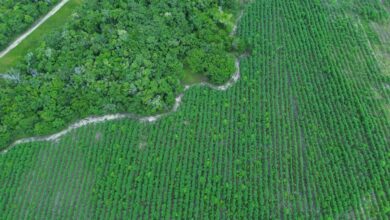Al-Masry Al-Youm met with Dr. Ossam El-Tayeb, Professor Emeritus of Microbiology and Immunology, founding Director of the Microbial Biotechnology Center at Cairo University, and Adviser to the Egyptian Biosafety Clearing House, as part of our Green Profile series, in which prominent figures discuss pressing environmental issues.
Al Masry Al Youm: What are Egypt's main concerns with regards to biodiversity loss?
Ossama El-Tayeb: We have no special concern. It is concern for humanity as a whole since biodiversity is the basis for life on earth. Loss of biodiversity is irreversible and biodiversity is a major player in natural ecosystems, which provide indispensable services (climate, water, energy, aesthetic, etc.) to the planet and its human inhabitants. With climate change, we will further need biodiversity to develop adapted varieties. The budding biotechnology and synthetic biology will need biodiversity as its genetic capital.
The world of microorganisms has not yet been tapped into by bio-technologists for novel products and processes. In the case of Egypt, although we are a hyper-arid zone we have a wealth of virgin ecosystems, with novel biodiversity, which have not been altered by human activity and this is not common on this planet.
Al Masry Al Youm: It is said that Egypt stands to lose most of its biodiversity within the next 20 years. What is currently being done to circumvent this loss?
Ossama El-Tayeb: There is nothing special about Egypt in this respect, and worldwide total loss of biodiversity will take millennia–not 20 years–and before such total loss we will have an imbalance.
The problem is that development of natural ecosystems in the West has disrupted biodiversity to the point of losing the vast majority of biodiversity through economic development of natural ecosystems. Most of the loss has been in plants and animals–including insects and other invertebrates, which play a major role in the natural food chain and balance between species. A species lost is compensated for by the flourishing of another–which may be harmful to the ecosystem services provided to humans.
With regards to biodiversity, humanity is a common unit and loss in one place–which is not reversible–is a loss to humanity as a whole. The current rate of biodiversity loss has accelerated as a result of human population growth and the desire of developing countries to mimic the historical pattern of the West.
In Egypt, conserving biodiversity is not a priority for the government which has drafted plans but implemented nothing except for assigning ‘protected areas’ which are often violated in the interest of, say tourist and land development activities.
The government has more pressing issues to tackle and the environment has, in fact, been reduced to air pollution and garbage collection, which is pitiful. Conceptually, Egypt is about 100 years behind the rest of the world including some of poorest countries of Africa. Egypt is one of very few countries which lacks legislation on biodiversity. There is a lack of vision and sense of responsibility.
Al Masry Al Youm: What is our agenda for the Convention on Biological Diversity (CBD) meeting currently taking place in Japan? What do we hope to achieve there?
Ossama El-Tayeb: Egypt does not have a separate agenda in Nagoya; it is a common agenda for developing countries, especially Africa, where Egypt plays a leading role. Nagoya is about the Convention of Biological Diversity (CBD) which, with 195 Parties, is the most popular environmental treaty. The CBD is one of the Rio conventions agreed to during the Earth Summit of 1992. It aims at the conservation of biodiversity, its sustainable use and sharing the benefits of exploitation between providers and users.
We feel that the third objective is the key to success with regards to the other two objectives since it makes biodiversity relevant to its custodians by making it profitable, so they will continue to maintain it. The providers are developing countries, while users include the developed countries which possess the technologies and resources for exploitation.
For the past 18 years we have been negotiating the issue of regulating access to biological material and sharing its benefits–known as ABS negotiations–and developed countries have not been willing to share benefits through an international protocol under the CBD.
Developing countries argued the lack of an ABS protocol has resulted in the failure of the CBD's two other objectives. In Nagoya, developing countries aim at a confrontation where if an effective protocol is not adopted, there is no point in continuing to pretend that the CBD is effective, and each country will apply national laws preventing the usurping of its national biodiversity (bio-piracy) and will not make any concessions on the commercial development of natural ecosystems for the sake of conserving biodiversity.
Al Masry Al Youm: The term 'biodiversity' is very vague, if not obscure, to Egyptians. Are there any awareness programs to help people understand the importance of biodiversity preservation?
Ossama El-Tayeb: To biologists and ecologists it has a clear meaning but perhaps to laypeople it is obscure. That is not uncommon with scientific terms. How much do laypeople in Egypt understand the concepts and cause and effect scenarios of climate change, energy or nuclear power? I would venture to say that even those entrusted with environmental decision making are hardly literate with regards to environmental concerns beyond issues such as the ‘black cloud’ and garbage collection problems.
We–the decision makers at Ministry of State for Environment–need to put more effort into public awareness of the range of environmental concerns including biodiversity. Currently they have clear plans but no implementation. It is interesting to note that many members of parliament are better informed of such issues than the executive branch.
Al Masry Al Youm: Where do we stand in implementing Egypt's National Biodiversity Strategy and Action Plan which was put in place in 1998?
Ossama El-Tayeb: This is a good question and the sorry answer is: Nothing! I would add the National Environmental Action Plan of 1972!
These plans were drafted with funds from foreign sources and costs were estimated. The government then waited for some foreign funds to implement it. These funds were, of course, not offered by anyone because this should be done through national implementation and must be mainstreamed into the national development plan so it cannot be funded by "aid" money!
The government looks at environmental issues as a burden on development and not as an asset. Environmental concerns are mostly owned by future generations who do not figure seriously in the minds of executives.
The issues of air pollution and garbage collection issues are among concerns for present generations. That is why they attract their attention and lip-service is provided in plenty! Even water pollution is not taken seriously because its impact is demonstrated in 10 to 30 years, which is too long for most executives to worry about. That is why we have one of the highest incidence of liver and kidney failures in the world, thanks to water pollution which has been taking place since the 1970s when it was predicted but looked at as too distant to deserve even lip-service.
The cost in lost labor force and medication now is much, much higher than the cost of prevention back then, but those who ignored its impact then, knew they were not accountable!
In similar fashion, those who ignore biodiversity now know they will not have to answer any questions even in 2020!




